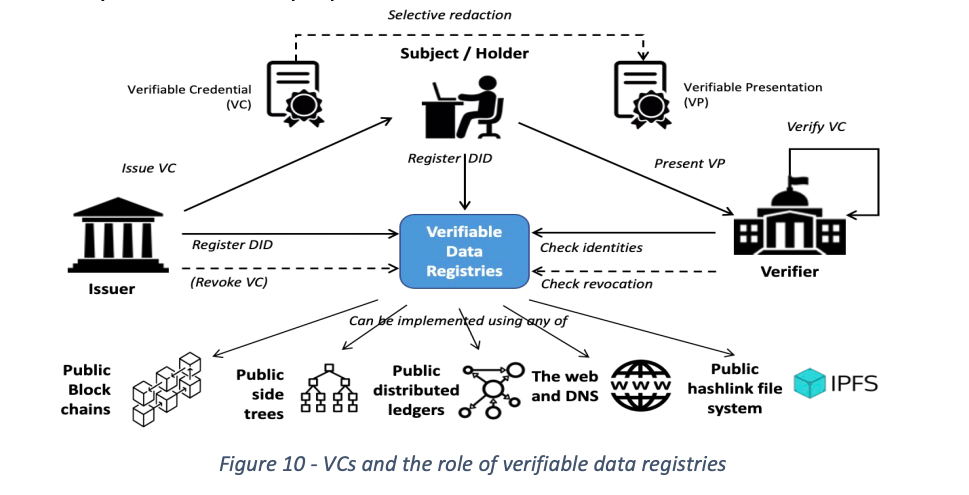
eData Verifiable Credentials: Simplifying and Securing Cross-Border Trade
The global trade landscape, valued at over $20 trillion annually, continues to rely heavily on a traditional, paper-based system for documentation (Image credit : UNECE White Paper). This approach is plagued by inefficiencies, delays, and vulnerabilities:
- Time-consuming processes: Manual verification of physical documents leads to bottlenecks at borders, hindering the flow of goods.
- Prone to errors: Data entry mistakes can cause discrepancies and disrupt trade transactions.
- Susceptibility to fraud: Counterfeit documents pose a significant threat, jeopardizing the integrity of the trade ecosystem and causing financial losses.
These drawbacks necessitate a paradigm shift towards a more secure and efficient solution. Enter eData Verifiable Credentials (VCs), a transformative technology poised to revolutionize cross-border trade.
eData VCs leverage the power of blockchain technology and cryptography to create secure digital representations of crucial trade documents like invoices, certificates of origin, and customs declarations. This presentation will delve into the world of eData VCs, exploring their:
- Functionalities and benefits in streamlining cross-border trade.
- Impact on stakeholders involved in the global trade ecosystem.
- The future potential of eData VCs in shaping a more secure and transparent trade landscape.
By embracing this innovative technology and fostering collaborative efforts, we can usher in a new era of efficiency, security, and transparency in global trade.
What are eData Verifiable Credentials?
eData VCs are essentially digital representations of physical documents used in cross-border trade. They leverage the power of:
- Blockchain technology: This distributed ledger system ensures secure storage and tamper-proof recording of data within the VC.
- Cryptography: Advanced encryption techniques guarantee the authenticity and confidentiality of the information contained within the VC.
Benefits of eData VCs for Cross-Border Trade :
- Streamlined Processes: Automation plays a key role. eData VCs can be electronically shared and verified, significantly reducing manual processing times at customs checkpoints. This translates to faster clearance of goods and reduced administrative burdens for businesses involved in international trade.
- Enhanced Security: Blockchain technology underpins the integrity of eData VCs. Any attempt to tamper with the data within the VC would be immediately flagged, minimizing the risk of fraud and counterfeit documents being used in cross-border transactions.
- Improved Transparency: eData VCs provide a clear audit trail, allowing all authorized parties involved in a trade transaction to track the document and verify its authenticity. This fosters trust and strengthens collaboration among trading partners.
- Reduced Costs: Eliminating the need for physical documents translates to significant cost savings. Businesses no longer need to incur expenses associated with printing, storing, and physically transporting trade documents.
- Faster Trade Flows: Streamlined verification processes enabled by eData VCs lead to expedited clearance of goods at borders. This reduces delays and ensures a smoother flow of goods in the global trade ecosystem.
How eData VCs Work in Cross-Border Trade :
- Issuance: Relevant authorities play a crucial role.Customs agencies: They can issue eData VCs containing information like customs declarations.Chambers of commerce: These entities can verify and issue VCs related to certificates of origin.
- Sharing: Secure digital channels are key.Dedicated platforms or mobile applications can be used for secure sharing of eData VCs between relevant parties like importers, exporters, and customs officials.
- Verification: Trust is established through verification.Anyone with access to a dedicated mobile app or online platform can verify the authenticity and validity of the eData VC. This eliminates the need to contact the issuing authority directly for verification purposes.
Real-World Examples :
- The United Nations Economic Commission for Europe (UNECE): This organization has taken a proactive role in promoting the adoption of eData VCs. They have developed a framework specifically designed for using eData VCs for critical trade documents like commercial invoices and certificates of origin. This framework paves the way for wider acceptance and implementation of the technology.
- TradeLens (by Maersk): This platform, though discontinued in November 2022, serves as a prime example of how eData VCs can be utilized in cross-border trade. TradeLens leveraged blockchain technology to facilitate the secure exchange of trade documents, including eData VCs.
Challenges and the Road Ahead :
While eData VCs hold immense potential, overcoming certain challenges is crucial for widespread adoption:
- Standardization: Global trade thrives on consistency. Establishing common standards for issuing, storing, and verifying eData VCs is essential for ensuring seamless integration across different countries and trade platforms.
- Infrastructure Development: The digital divide remains a concern. Investments in digital infrastructure, particularly in developing economies, are necessary to ensure all participants in the global trade ecosystem have access to the technology and resources required to utilize eData VCs effectively.
- Capacity Building: Building trust and knowledge is key. Training stakeholders like customs officials, businesses, and other relevant parties on how to utilize eData VC technology is crucial for successful implementation.
Moving Forward with eData Verifiable Credentials
Overcoming the challenges mentioned above necessitates a concerted effort from various stakeholders:
- Governments: They can play a vital role in:Developing and implementing regulatory frameworks that promote the adoption of eData VCs while safeguarding data privacy and security.Investing in infrastructure development to bridge the digital divide and ensure accessibility for all participants in the global trade landscape.Collaborating with international organizations to establish common standards and facilitate the seamless exchange of eData VCs across borders.
- Businesses: Embracing this technology offers significant benefits. Businesses can:Invest in eData VC solutions to streamline their trade operations and reduce administrative costs.Advocate for the adoption of eData VCs within their industries and collaborate with other stakeholders to promote wider acceptance.Participate in pilot programs and initiatives to gain practical experience with eData VC technology and contribute to its development.
- Technology Providers: Driving innovation is crucial. They can:Develop user-friendly and secure platforms for issuing, storing, and verifying eData VCs.Ensure interoperability between different eData VC solutions to facilitate seamless integration across various trade ecosystems.Collaborate with other stakeholders to address security concerns and build trust in the technology.
Potential Future Applications :
The potential applications of eData VCs extend beyond streamlining documentation:
- Trade Finance: eData VCs can significantly improve access to trade finance by enabling faster and more secure verification of trade documents. Financial institutions can rely on the tamper-proof nature of eData VCs to make quicker lending decisions, fostering trade growth.
- Supply Chain Visibility: eData VCs can be embedded with track-and-trace functionalities. This allows for real-time monitoring of the movement of goods throughout the supply chain, enhancing transparency and ensuring product authenticity. This can be particularly beneficial for industries like pharmaceuticals and food & beverage, where maintaining product integrity is critical.
- Regulatory Compliance: eData VCs can simplify compliance with complex trade regulations. By embedding relevant regulatory information within the VC, businesses can demonstrate adherence to regulations in a secure and verifiable manner, reducing the risk of non-compliance penalties.
eData Verifiable Credentials represent a transformative force in the realm of cross-border trade. By embracing this technology and fostering global collaboration, we can usher in a new era of:
- Efficiency: Streamlined processes and faster clearance of goods at borders.
- Security: Enhanced protection against fraud and counterfeit documents.
- Transparency: Clear audit trails and improved trust among trading partners.
- Cost Reduction: Elimination of paper-based documents and associated expenses.
Stakeholders in the eData Verifiable Credentials (eData VCs) Ecosystem:
A successful eData VC ecosystem requires the active participation and collaboration of various stakeholders, each playing a crucial role:
1. Governments:
- Policy and Regulation: Developing frameworks that:Establish standards for issuing, storing, and verifying eData VCs.Ensure data privacy and security throughout the lifecycle of eData VCs.Facilitate interoperability between different eData VC solutions.
- Infrastructure Development: Investing in:Digital infrastructure to ensure widespread accessibility, particularly in developing economies.Border management systems capable of processing and verifying eData VCs efficiently.
- International Collaboration: Working with other governments and international organizations to:Harmonize regulations across borders for seamless cross-border trade.Develop common standards for eData VCs to facilitate global adoption.
2. Businesses:
- Early Adoption: Implementing eData VC solutions to:Streamline trade operations and reduce administrative costs.Enhance supply chain visibility and improve logistics efficiency.Gain a competitive edge by offering faster and more secure trade transactions.
- Industry Advocacy: Promoting the adoption of eData VCs within their respective industries.
- Collaboration: Working with technology providers and other stakeholders to:Develop industry-specific use cases for eData VCs.Pilot test and refine eData VC solutions to ensure practical implementation.
3. Technology Providers:
- Solution Development: Creating user-friendly and secure platforms for:Issuing and managing eData VCs.Verifying the authenticity and validity of eData VCs.Integrating eData VCs with existing trade platforms and systems.
- Interoperability: Ensuring their solutions can seamlessly interact with other eData VC platforms.
- Security Standards: Adhering to the highest security standards to safeguard sensitive trade data within eData VCs.
4. International Organizations:
- Standards Development: Setting global standards for eData VCs to:Ensure consistency and interoperability across different countries and trade platforms.Promote the secure exchange of trade information using eData VCs.
- Knowledge Sharing: Providing resources and guidance to:Governments on developing effective policy frameworks for eData VCs.Businesses on implementing eData VC solutions in their trade operations.
5. Academia and Research Institutions:
- Research and Development: Contributing to the ongoing development of eData VC technology by:Exploring new applications for eData VCs beyond cross-border trade.Addressing emerging challenges related to security, scalability, and privacy.
- Education and Training: Providing training programs for stakeholders on:The functionalities and benefits of eData VCs.The secure use and management of eData VCs in various trade scenarios.
Additional Stakeholders:
- Customs Agencies: Playing a vital role in:Implementing eData VC verification procedures at borders.Collaborating with other stakeholders to ensure smooth clearance of goods using eData VCs.
- Chambers of Commerce: Issuing eData VCs related to:Certificates of origin to verify the source of goods.Other trade-related documents that can benefit from the security and efficiency of eData VCs.
By fostering a collaborative environment and actively engaging all stakeholders, the eData VC ecosystem can flourish, paving the way for a more secure, efficient, and transparent global trade landscape.
eData VCs represent a paradigm shift in the realm of international commerce. By leveraging the power of blockchain technology and cryptography, they offer a secure, transparent, and efficient solution to the challenges plaguing paper-based documentation.
Embracing this technology necessitates a concerted effort from various stakeholders – governments, businesses, technology providers, and international organizations. Through collaboration and innovation, we can unlock the immense potential of eData VCs and usher in a new era of:
- Streamlined Processes: Faster clearance of goods at borders.
- Enhanced Security: Minimized risk of fraud and counterfeit documents.
- Improved Transparency: Clear audit trails fostering trust among trading partners.
- Reduced Costs: Elimination of paper-based documents and associated expenses.
By working together, we can transform the global trade landscape, paving the way for a more secure, efficient, and prosperous future for all.
Additional Resources:
- UNECE White Paper: eData Verifiable Credentials for Cross Border Trade: https://unece.org/sites/default/files/2023-08/WhitePaper_VerifiableCredentials-CrossBorderTrade_September2022.pdf
- TradeLens: https://www.maersk.com/news/articles/2022/11/29/maersk-and-ibm-to-discontinue-tradelens
